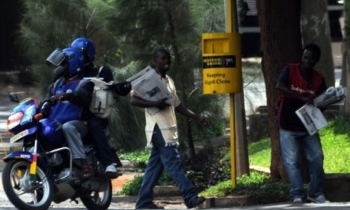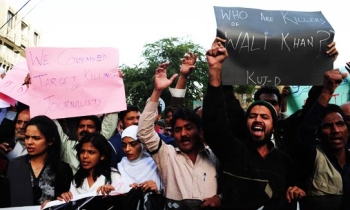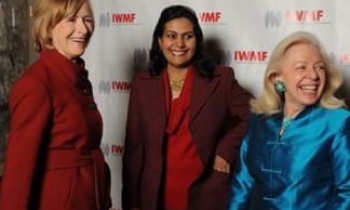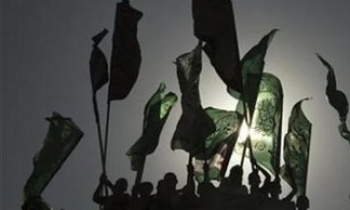A Cairo court has sentenced four independent editors to one-year jail terms for publishing “false information.” Editors Ibrahim Eissa of the daily Al-Dustour, Wael al-Abrashy of the weekly Sawt al-Umm, Adel Hammouda of the weekly Al-Fajr, and Abdel Halim Kandil, former editor of the weekly Al-Karama were convicted Thursday of “publishing false information likely to disturb public order” in a case initiated by a lawyer affiliated with the ruling National Democratic Party.
The lawyer accused the editors of defaming President Hosni Mubarak and his top aides, including his son Gamal Mubarak, and of spreading false information.
“By jailing journalists merely for something they published, Egypt once again thumbs its nose at the most basic principles of a free press,” said Comittee to Protect Journalists (CPJ) Executive Director Joel Simon. “The court also appears to be exacting retribution on the press after its recent coverage of President Mubarak’s health.”
“We are witnessing a crackdown on independent publications which had enjoyed a relative respite in recent years,” Reporters sans Frontières (RSF) said. “Once again, it is the same journalists, ones known for being critical of the government, that are being targeted.”
The Union of Egyptian Journalists described the sentences as a “declaration of war on press freedom” and demanded the repeal of all laws that allow journalists to be jailed. The press law adopted last year defines no fewer than 35 press offences that are punishable by imprisonment.
“This verdict appears to signal that the Egyptian government is engaged in a dangerous crackdown on freedom of the press,” said International Federation of Journalists (IFJ) General Secretary Aidan White. “Besides the clear political motivation for the case, the sentences themselves are punitive and inappropriate for media offences.”
The four editors had triggered the legal action by publishing articles that denounced Mubarak over verbal attacks against the Lebanese Shiite group Hezbollah, and criticised several high level officials and Mubrak’s son Gamal who, despite officials denials, is believed to be the 79 year-old president’s heir apparent, the Associated Press (AP) reported.
The court dropped the charge of defamation, but found the four editors guilty under Article 188 of the Penal Code and handed them the maximum sentence stipulated by this article, one year in prison, and also the maximum fine, 20,000 Egyptian pounds (nearly US$3,540). Article 188 stipulates that anyone who “malevolently makes public pieces of information or statements or false rumours” will be punished by a maximum one-year prison sentence and a fine that would not exceed 20,000 EP.
Eissa, al-Abrashy, Hammouda, and Kandil were ordered by the court to pay a 10,000 EP (US$1,770) bail and were free pending their appeal.
The decision comes amid rising attacks on journalists and widespread concern about the future of freedom of expression in the country.
In a separate development, on Tuesday the state security general prosecutor charged Eissa, a prominent critic of Mubarak, with publishing reports “likely to disturb public security and damage the public interest” in relation to articles and headlines about President Mubarak’s allegedly declining health. Eissa is to appear before a state security court on October 1.
Thursday's convictions and Eissa’s upcoming trial follow a campaign by Egyptian officials and the state-backed press criticising “rumormongering” by Egyptian newspapers. Earlier this month, Egyptian First Lady Suzanne Mubarak made a rare and strong rebuke of the press in an interview with Al-Arabiya satellite channel, stating that her husband’s health was “excellent” and that “there must be punishment either for a journalist, a television program, or a newspaper that publishes the rumors.”
“This is undoubtedly a new attempt on the part of the government to terrorize journalists and to stifle their voices in order to control any future information about President Mubarak’s health and ability to remain in power,” said Nasser Amine, head of the Cairo-based Arab Centre for the Independence of the Judiciary and the Legal Profession.
The Egyptian Organisation for Human Rights confirmed in its annual report for 2006, published last week, that attacks on freedom of expression and the press and the prosecution of journalists for “expressing their opinions” were on the rise and expressed its deep concern about the ongoing attempts to silence independent journalists.
In May, CPJ designated Egypt as one of the world’s worst backsliders on press freedom, citing an increase in the number of attacks on the press over the past five years.









